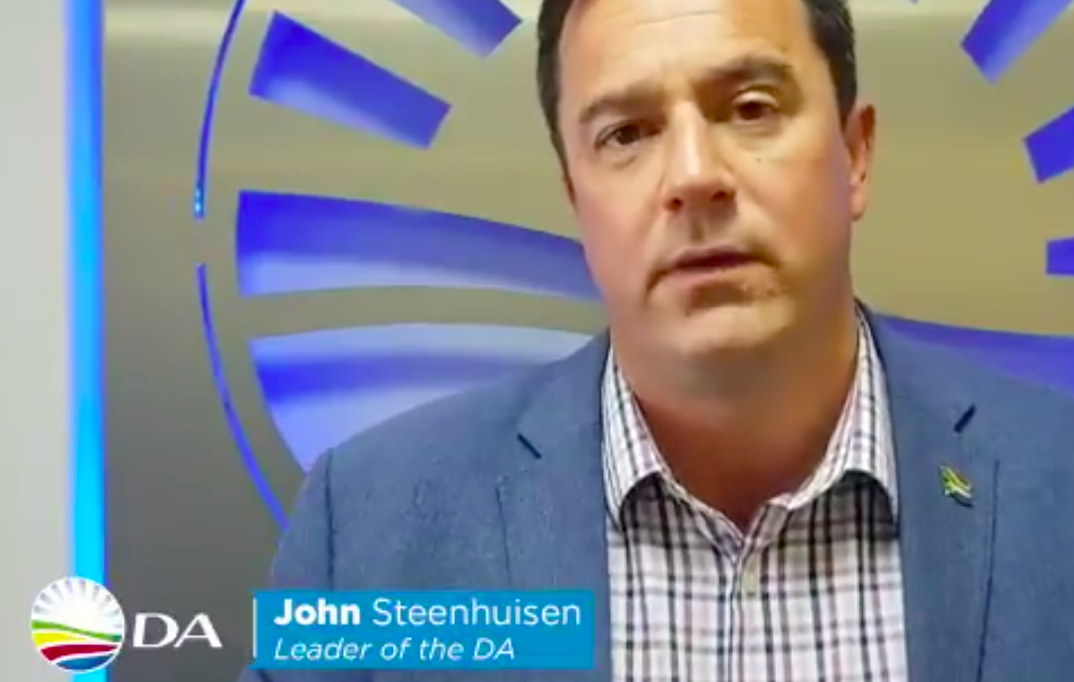Steenhuisen says for more than 25 years, South Africa has not had any meaningful tax reform that seeks to put more money in the pockets of ordinary South Africans.

A DA resolution to end farm attacks and murders and adopt it as part of the party’s policy received resounding approval during the second day of the party’s virtual elective congress.
The DA will now push for the government to declare farm murders a hate crime and priority crime with harsher sentences if prosecutors prove the intent was hatred, based on the victim’s identity as a farmer.
The proposal was brought forward by MP Dianne Kohler Barnard, who stressed the importance of the state attending to rural communities.
Motivating in less than two minutes to delegates across the country, she said rural communities were under enormous threat.
She added that in the last 10 years, 612 farmers and farmworkers have been murdered and 2 818 have been attacked, maimed, raped, crippled or blinded.
“The SAPS plan has failed and farmers, black and white, their wives, children and parents are four times more likely to be killed than the average South African,” she said.
Her seconder, party member Noko Masipa, said farm attacks were also negatively affecting the economy and the livelihood of farmers. He added that stock theft had intensified so much that some farmers have decided to abandon the trade completely.
The proposal received 91.38% approval.
The proposal comes after the murder of farm manager Brendin Horner, which led to massive protests in the small town of Senekal in the Free State, putting the plight of farmers at the forefront of South Africa’s conversation.
The DA also discussed some of the resolutions which will be taken to the federal executive committee for further deliberation.
These include the following:
Protect and expand private property rights to ensure sustainable land reform
The proposal came from outgoing DA interim leader John Steenhuisen, who said: “South Africa remains a deeply unequal society, one of the most stark demons is around the issue of land ownership and property. We, as a party that offers a vision for the future, have got to be able to tackle this particular issue and get to grips with it,” he said, adding that the DA must endeavour to put property into the hands of many more South Africans.
He added that the proposal by the ANC to amend Section 25 of the Constitution to allow for expropriation without compensation would take property away from private citizens towards an incapable state, killing investment and driving more people to the unemployment queue.
His seconder, Andrew Louw, said the proposed resolution didn’t mean the DA didn’t care about fighting for justice through land reform. Where the DA governs, he said, people’s lives have been changed by a successful land reform programme and accelerated title deeds programme.
Job opportunities within the tourism sector:
Proposed by Manny de Freitas, this proposal reinforces an existing DA policy.
“Tourism can create jobs relatively with minimal training, provided that government ensure basic infrastructure is in place,” he said.
Promote and defend access to mother-tongue education:
DA’s Leon Schreiber said this proposed resolution was a fundamentally important element to the DA’s commitment to equality of opportunity and to diversity.
It would ensure that the DA commits to fighting and working actively to make mother-tongue access reasonably practical to more places.
Cutting the public sector wage bill to help stabilise public finances:
Nicole Graham said the proposed resolution was important to confront the disproportionate wage bill against the spend in other services, adding that it was completely unsustainable.
“This is a result of political patronage networks that the ANC has created and does not give value for money to South Africans who need those services the most.”
She said the proposal was to ensure the state could protect frontline workers and ensure that the government was not a get-rich-quick scheme for ANC comrades.
Embrace federalism by devolving substantial powers to well-run local and provincial governments:
Western Cape premier Alan Winde who made the proposal, said there was a need to devolve more national powers to municipalities to ensure the delivery of services.
By decentralising powers from the state, Winde said, municipalities have control of police, railways, ports, water storage, electricity generation and fishing.
“When those powers aren’t there, is it much more difficult to deliver to citizens; we end up with an unfunded mandate.”
Becoming a party of fiscal discipline:
Advancing his argument, DA MP Geordin Hill-Lewis said South Africa was at an advance stage of fiscal crisis and in a debt trap.
“One of the things that sets us [apart] as the DA is that we recognise that a key responsibility of every DA government is the careful stewardship of public money.”
He added that the country was paying R250 billion interest, which is unsustainable, which meant there was less to spend on basic public services, adding that the resolution was realistic and achievable by a DA government.
Outlaw cadre deployment to build a better government:
Leon Schreiber said: “ANC cadre appointment lies at the heart of why corruption has continued unabated. The only way to tackle it is to aim at policies that enable the ANC to appoint cadres.”
Seconder, Cilliers Brink, said there was a need for a clear distinction between the work of politicians and the work of career civil servants adding that most municipality trends have been to politicise municipal administration with officials appointed on the basis of their politics.
Deregulate the labour market and collective bargaining to create jobs:
Steenhuisen said that South Africa’s unemployment crisis had a large majority effect on the youth who remain locked out of opportunities.
“If we are going to unleash a job revolution, we need to urgently look at our labour legislation, make it easier for businesses to hire people and keep them employed,” he said.
He said the DA needed to break the back of the collective bargaining system which binds small businesses who don’t have a seat at the negotiating table to wage negotiations agreed upon without them.
Steenhuisen said the current labour regime was not steeped in the country’s labour realities.
Provide tax relief to citizens and reduce government spending:
“For more than 25 years, South Africa has not had any meaningful tax reform that seeks to put more money in the pockets of ordinary South Africans. This is important if we want to drive a supply and demand-driven economy that can only be done if more people have more money in their pockets. Currently, South Africa is one of the overburdened and overtaxed countries in the world, which is simply not sustainable,” proposer and DA MP Dean Macpherson said.
He said the country has also been burdened by collapsing tax returns, capital flights out of the country because of the overburdening and heavy tax regime.
Seconder Ghaleb Cachalia said workers who created wealth felt the brunt of a high tax burden. He added that high tax rates impacted wages and product prices went up, leading to inflation.
For more news your way, download The Citizen’s app for iOS and Android.
Support Local Journalism
Add The Citizen as a Preferred Source on Google and follow us on Google News to see more of our trusted reporting in Google News and Top Stories.








